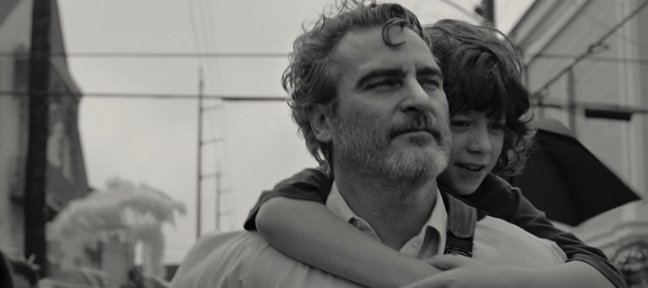In “C’mon C’mon,” Joaquin Phoenix plays radio journalist Johnny, a documentary filmmaker whose sister (Gaby Hoffman) asks him to care for her 8-year-old son, Jesse (Woody Norman). Vic is trying to tend to the child’s father, who’s suffering from bipolar disorder. Johnny and Jesse both end up travelling cross-country doing interviews for a news piece he’s working on and, in the process, aw shucks, form a special connection.
Mike Mills’ “C’mon C’mon” is meant to be one of those films where incompatible adult and child come out of an experience feeling grown, whole and closer than ever. The film was shot by DP Robbie Ryan in beautifully rendered monochrome cinematography. And yet, the Black and White isnt necessarily needed here, rather, it makes the whole thing feel more twee than it already is.
The main thematic proponent Mills tackles here is “what does the future hold for Gen Z’ers?” Since Phoenix plays a filmmaker, Mills keeps interjecting the narrative with real-life interviews of children speaking directly to the camera about their future. It’s a misbegotten attempt by Mills at creating a docu-fiction vibe to the film.
Mills’ story is shapeless. It’s purposely incoherent, rendered in a French New Wave-esque matter. The scenery also keeps changing, Johnny and Jesse go from L.A. to New York City to, of all places, New Orleans, but the monotone vibe remains. “C’mon C’mon” largely fixates its ambitions on how Johnny manages to parent his way through the journey; especially when it comes to Jesse’s impulsive behaviours. The two have verbal arguments over food, bedtime, and, the elephant in the room, Johnny’s mentally ill father. Their bonding consists of playing around with Johnny’s radio equipment, bedtime stories, and verbally childish amusements.
If you’ve seen “20th Century Women” and “Beginners,” Mills likes to make sweet movies about angst and familial dysfunction. An ode to midlife anxieties and parenting, “C’mon C’mon” is an honest movie but one filled with a bad case of self-serious indulgence. The film feels self-congratulatory in tone and delivery. It’s dramatically inept and a little too manufactured to tug at our heartstrings.
As much as I’ve championed Phoenix as one of the great living actors, it pains me to say that he’s miscast here. The actor tries to, for once, embody a “normal” character but it just doesn’t work. He’s best at playing unstable eccentrics rather than any kind of subdued and endearing big city schlub ala Mark Ruffalo.





